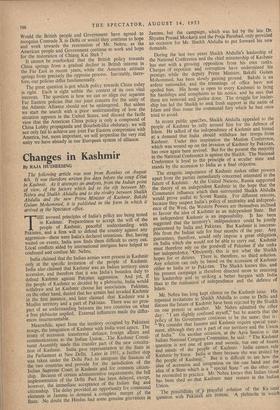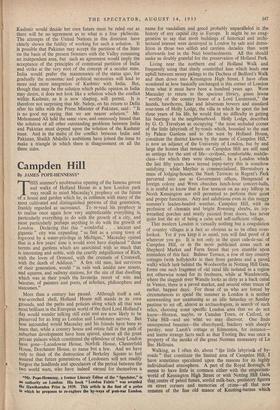Changes in Kashmir
By RAJA KU THEESING The following article was sent from Bombay on August 4th. It was therefore written five days before the coup d'etat in Kashmir. As it attempts an analysis, from the Indian point of view, of the factors which led to the rift between Mr. Nehru and Shaikh Abdulla and to the rivalry between Shaikh Abdulla and the new Prime Minister of Kashmir, Bakshi Gulam Mohommed, it is published in the form in which it arrived at the Spectator office. THE avowed principles of India's policy are being tested in Kashmir. Preparedness to accept the will of the people of Kashmir, peaceful understanding with Pakistan, and a firm will to defend the country against any aggression—these were India's declared intentions. But, having waited on events, India now finds them difficult to carry out. Local conflicts aided by international intrigues have helped to confound and confuse Mr. Nehru.
India claimed that the Indian armies were present in Kashmir only at the specific invitation of the people of Kashmir. India also claimed that Kashmir was an Indian territory since accession, and therefore that it was India's bounden duty to defend Kashmir against Pakistan aggression. And yet, if the people of Kashmir so decided by a plebiscite, India would withdraw and let Kashmir choose her association. Pakistan, on the other hand, denied that her armies had invaded Kashmir in the first instance, and later claimed that Kashmir was a Muslim territory and a part of Pakistan. There was no pros- pect of an understanding between the two countries on what a free plebiscite implied. External influences made the differ- ences insurmountable.
Meanwhile, apart from the territory occupied by Pakistani troops, the integration of Kashmir with India went apace. The treaty of accession transferred defence, foreign affairs and communications to the Indian Union. The Kashmir Consti- tuent Assembly made this transfer part of the new constitu- tion of Kashmir. India gave representation to the State in the Parliament at New Delhi. Later in 1951, a further step was taken under the Delhi Pact to integrate the finances of the two countries and provide for the jurisdiction of the Indian Supreme Court in Kashmir and for common citizen- ship, Because of certain administrative requirements, the full implementation of the Delhi Pact has been delayed, except, however, the immediate acceptance of the Indian flag and citizenship. The delay provided an opportunity for communal elements in Jammu to demand a complete merger of the State. No doubt the Hindus had some genuine grievances in Jammu, but the campaign, which was led by the late Dr. Shyama Prasad Mookerji and the Praja Parishad, only provided an occasion for Mr. Shaikh Abdulla to put forward his new demands.
During the last two years Shaikh Abdulla's leadership of the National Conference and the chief ministership of Kashmir has met with a growing opposition from his own ranks. Charges of nepotism and corruption have undermined his prestige, while the deptity Prime Minister, Bakshi Gulam Mohommed, has been slowly gaining ground. Bakshi is an ardent nationalist, and the trimmings of office have not spoiled him. His home is open to every Kashmiri to bring his hardships and complaints to his notice, and he sees that these are removed and justice done. The struggle for leader- ship has led the Shaikh to seek fresh support in the name of Islam and thus rouse the communal fury which he had once tried to avoid.
In recent public speeches, Shaikh Abdulla, appealed to the people of Kashmir to rally around him for the defence of Islam. He talked of the independence of Kashmir and hinted at a demand that India should withdraw her troops from Kashmir. Under this inspiration the Muslim Conference, which was wound up on the invasion of Kashmir by. Pakistan, has once again been revived. But for the present the majority in the National Conference is against the Shaikh. The National Conference is loyal to the principle of a secular state and stands by the accession to India as a final objective.
The stragetic importance of Kashmir makes other powers apart from the parties immediately concerned interested in the future of Kashmir. At the United Nations, Russia supported the theory of an independent Kashmir in the hope that the Communist influence which then surrounded Shaikh Abdulla would prove useful to Soviet Russia. For different reasons, because they suspect India's policy of neutrality and independ- ence of the West, the Western Powers are themselves inclined to favour the idea of Kashmir as an independent State. But an independent Kashmir is an impossibility. It has been suggested that the territory's independence could be jointly guaranteed by India and Pakistan. But Kashmir is inaccess- ible from the Indian side for four months of the year. Any guarantees,' therefore, would only impose a great obligationl on India which she would not be able to carry out. Kashmir must therefore rely on the goodwill of Pakistan if she seeks her independence. --Obviously, this is not what the Shaikh hopes for or desires. There is, therefore, no third solution. Any solution can only be based on the accession of Kashmir either to India or to Pakistan. The Shaikh knows this, and his present campaign is therefore directed more to retaining his leadership and to striking a better bargain with India than to the realisation of independence and the defence of Islam.
Mr. Nehru has long kept silence on the Kashmir issue. His repeated invitations to Shaikh Abdulla to come to Delhi and discuss the future of Kashmir have been rejected by the Shaikh on one pretext or another. Mr. Nehru admitted the other day : " I am slightly confused myself," but he asserts that the policy of his Government continues to be the same; that is : We consider that Jammu and Kashmir require special treat- ment, although they are a part of our territory and the Union of India." On another occasion, at the Agra Session o: the Indian National Congress Committee, he said : "The Kashmir question is not one of guns and swords, but one of hearts and minds of the people of Kashmir. India cannot, rule Kashmir by 'force. India is there because she was invited by the people of Kashmir." But it is difficult to see how the idea of accession and integration on the one hand and the idea of a State which is a special State " on the other, can be reconciled in practice. Mr. Nehru knows that Indian blood has been shed so that Kashmir may remain in the Indian Union.
The possibilities of a peaceful solution of the Ka hmir question with Pakistan are remote: 'A plebiscite in wnich Kashmir would decide her own future must be ruled out as there will be no 'agreement as to what is a free plebiscite. The attempts of the United Nations in this direction have clearly shown the futility of working for such a solution. It is possible that Pakistan may accept the partition of the State on the basis of the present frontiers with the Valley remaining an independent area, but such an agreement would imply the acceptance of the principles of communal partition of India and strike at the very root of the concept of a secular state. India would prefer the maintenance of the status quo, for gradually the economic' and political necessities will lead to more and more integration of Kashmir with India. But, though that may be the solution which public opinion in India may desire, it does not look like a solution which the conflict within Kashmir, as it is now shaping, will permit. It is therefore not surprising that Mr. Nehrp, on his return to Delhi after his talks with the Prime Minister of Pakistan, said : " It is no good my saying that we are nearer solution." Mr. Mohommed Ali held the same view, and ominously hinted that the solution of all other outstanding problems between India and Pakistan must depend upon the solution of the Kashmir issue. And in the midst of the conflict between India and Pakistan, Shaikh Abdulla's ambitions have joined the issue to make a triangle in which there is disagreement on all the three sides.



































 Previous page
Previous page